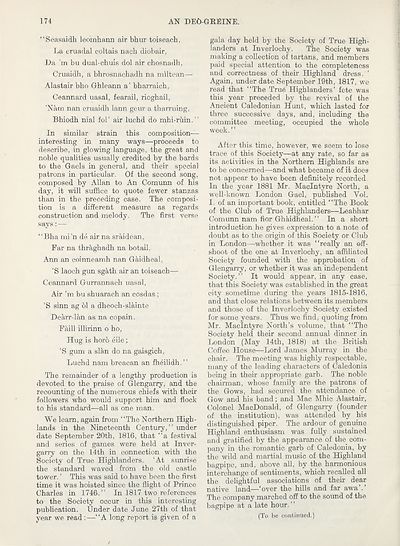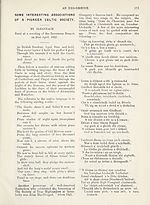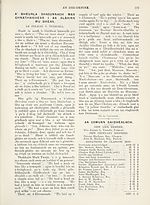An Comunn Gàidhealach Publications > Deo-gréine > Volume 16, October 1920-September 1921
(182) Page 174
Download files
Complete book:
Individual page:
Thumbnail gallery: Grid view | List view

174
AN DEO-GREINE.
“Seasaidh leomhann air bhur toiseach,
La cruadal coltais nach diobair,
Da ’in bu dual-chuis dol air chosnadh,
Cruaidh, a bhrosnachadh na mlltean—
Alastair bho Ghleann a’ bharraich,
Ceannard nasal, fearail, rioghail,
’Nam nan cruaidh lann geur a tharruing,
Bhiodh nial fol’ air luchd do mhi-riiin.”
In similar strain this composition-
interesting in many ways—proceeds to
describe, in glowing language, the great and
noble qualities usually credited by the bards
to the Gaels in general, and their special
patrons in particular. Of the second song,
composed by Allan to An Comunn of his
day, it will suffice to quote fewer stanzas
than in the preceding case. The composi¬
tion is a different measure as regards
construction and melody. The first verse
says:—
“Bha mi’n d^ air na sraidean,
Far na thrkghadh na botail,
Ann an coirmeamh nan Gaidheal,
’S laoch gun sgath air an toiseach—
Ceannard Gurrannach uasal,
Air’m bu shuarach an cosdas ;
’S sinn ag 61 a dheoch-slainte
Dearr-lan as na copain.
Faill illirinn o ho,
Hug is hor6 eile;
’S gum a slkn do na gaisgich,
Luchd nam breacan an fh^ilidh.”
The remainder of a lengthy production is
devoted to the praise of Glengarry, and the
recounting of the numerous chiefs with their
followers who would support him and flock
to his standard—all as one man.
We learn, again from “The Northern High¬
lands in the Nineteenth Century, ’ ’ under
date September 20th, 1816, that “a festival
and series of games were held at Inver-
garry on the 14th in connection with the
Society of True Highlanders. ‘At sunrise
the standard waved from the old castle
tower. ’ This was said to have been the first
time it was hoisted since the flight of Prince
Charles in 1746.’’ In 1817 two references
to the Society occur in this interesting
publication. Under date June 27th of that
year we read:—“A long report is given of a
gala day held by the Society of True High¬
landers at Inverlochy. The Society was
making a collection of tartans, and members
paid special attention to the completeness
and correctness of their Highland dress. ’
Again, under date September 19th, 1817, we
read that “The True Highlanders’ fete was
this year preceded by the revival of the
Ancient Caledonian Hunt, which lasted for
three successive days, and, including the
committee meeting, occupied the whole
week.’’
After this time, however, we seem to lose
trace of this Society—at any rate, so far as
its activities in the Northern Highlands are
to be concerned—and what became of it does
not appear to have been definitely recorded.
In the year 1881 Mr. MacIntyre North, a
well-known London Gael, published Vol.
I. of an important book, entitled “The Book
of the Club of True Highlanders—Leabhar
Comunn nam fior Ghkidheal.’’ In a short
introduction he gives expression to a note of
doubt as to the origin of this Society or Club
in London—whether it was “really an off¬
shoot of the one at Inverlochy, an affiliated
Society founded with the approbation of
Glengarry, or whether it was an independent
Society.’’ It would appear, in any case,
that this Society was established in the great
city sometime during the years 1815-1816,
and that close relations between its members
and those of the Inverlochy Society existed
for some years. Thus we find, quoting from
Mr. MacIntyre North’s volume, that “The
Society held their second annual dinner in
London (May 14th, 1818) at the British
Coffee House—Lord James Murray in the
chair. The meeting was highly respectable,
many of the leading characters of Caledonia
being in their appropriate garb. The noble
chairman, whose family are the patrons of
the Gows, had secured the attendance of
Gow and his band; and Mac Mhic Alastair,
Colonel MacDonald, of Glengarry (founder
of the institution), was attended by his
distinguished piper. The ardour of genuine
Highland enthusiasm was fully sustained
and gratified by the appearance of the com¬
pany in the romantic garb of Caledonia, by
the wild and martial music of the Highland
bagpipe, and, above all, by the harmonious
interchange of sentiments, which recalled all
the delightful associations of their dear
native land—‘over the hills and far awa’.’
The company marched off to the sound of the
bagpipe at a late hour.’’
(To be continued.)
AN DEO-GREINE.
“Seasaidh leomhann air bhur toiseach,
La cruadal coltais nach diobair,
Da ’in bu dual-chuis dol air chosnadh,
Cruaidh, a bhrosnachadh na mlltean—
Alastair bho Ghleann a’ bharraich,
Ceannard nasal, fearail, rioghail,
’Nam nan cruaidh lann geur a tharruing,
Bhiodh nial fol’ air luchd do mhi-riiin.”
In similar strain this composition-
interesting in many ways—proceeds to
describe, in glowing language, the great and
noble qualities usually credited by the bards
to the Gaels in general, and their special
patrons in particular. Of the second song,
composed by Allan to An Comunn of his
day, it will suffice to quote fewer stanzas
than in the preceding case. The composi¬
tion is a different measure as regards
construction and melody. The first verse
says:—
“Bha mi’n d^ air na sraidean,
Far na thrkghadh na botail,
Ann an coirmeamh nan Gaidheal,
’S laoch gun sgath air an toiseach—
Ceannard Gurrannach uasal,
Air’m bu shuarach an cosdas ;
’S sinn ag 61 a dheoch-slainte
Dearr-lan as na copain.
Faill illirinn o ho,
Hug is hor6 eile;
’S gum a slkn do na gaisgich,
Luchd nam breacan an fh^ilidh.”
The remainder of a lengthy production is
devoted to the praise of Glengarry, and the
recounting of the numerous chiefs with their
followers who would support him and flock
to his standard—all as one man.
We learn, again from “The Northern High¬
lands in the Nineteenth Century, ’ ’ under
date September 20th, 1816, that “a festival
and series of games were held at Inver-
garry on the 14th in connection with the
Society of True Highlanders. ‘At sunrise
the standard waved from the old castle
tower. ’ This was said to have been the first
time it was hoisted since the flight of Prince
Charles in 1746.’’ In 1817 two references
to the Society occur in this interesting
publication. Under date June 27th of that
year we read:—“A long report is given of a
gala day held by the Society of True High¬
landers at Inverlochy. The Society was
making a collection of tartans, and members
paid special attention to the completeness
and correctness of their Highland dress. ’
Again, under date September 19th, 1817, we
read that “The True Highlanders’ fete was
this year preceded by the revival of the
Ancient Caledonian Hunt, which lasted for
three successive days, and, including the
committee meeting, occupied the whole
week.’’
After this time, however, we seem to lose
trace of this Society—at any rate, so far as
its activities in the Northern Highlands are
to be concerned—and what became of it does
not appear to have been definitely recorded.
In the year 1881 Mr. MacIntyre North, a
well-known London Gael, published Vol.
I. of an important book, entitled “The Book
of the Club of True Highlanders—Leabhar
Comunn nam fior Ghkidheal.’’ In a short
introduction he gives expression to a note of
doubt as to the origin of this Society or Club
in London—whether it was “really an off¬
shoot of the one at Inverlochy, an affiliated
Society founded with the approbation of
Glengarry, or whether it was an independent
Society.’’ It would appear, in any case,
that this Society was established in the great
city sometime during the years 1815-1816,
and that close relations between its members
and those of the Inverlochy Society existed
for some years. Thus we find, quoting from
Mr. MacIntyre North’s volume, that “The
Society held their second annual dinner in
London (May 14th, 1818) at the British
Coffee House—Lord James Murray in the
chair. The meeting was highly respectable,
many of the leading characters of Caledonia
being in their appropriate garb. The noble
chairman, whose family are the patrons of
the Gows, had secured the attendance of
Gow and his band; and Mac Mhic Alastair,
Colonel MacDonald, of Glengarry (founder
of the institution), was attended by his
distinguished piper. The ardour of genuine
Highland enthusiasm was fully sustained
and gratified by the appearance of the com¬
pany in the romantic garb of Caledonia, by
the wild and martial music of the Highland
bagpipe, and, above all, by the harmonious
interchange of sentiments, which recalled all
the delightful associations of their dear
native land—‘over the hills and far awa’.’
The company marched off to the sound of the
bagpipe at a late hour.’’
(To be continued.)
Set display mode to:
![]() Universal Viewer |
Universal Viewer | ![]() Mirador |
Large image | Transcription
Mirador |
Large image | Transcription
| An Comunn Gàidhealach > An Comunn Gàidhealach Publications > Deo-gréine > Volume 16, October 1920-September 1921 > (182) Page 174 |
|---|
| Permanent URL | https://digital.nls.uk/125656171 |
|---|
| Description | Leabhar 16, Mìos Deireannach an Fhogharaidh 1920 gu Darna Mìos an Fhoghair 1921 |
|---|---|
| Attribution and copyright: |
|
| Description | This contains items published by An Comunn, which are not specifically Mòd-related. It includes journals, annual reports and corporate documents, policy statements, educational resources and published plays and literature. It is arranged alphabetically by title. |
|---|
| Description | A collection of over 400 items published by An Comunn Gàidhealach, the organisation which promotes Gaelic language and culture and organises the Royal National Mòd. Dating from 1891 up to the present day, the collection includes journals and newspapers, annual reports, educational materials, national Mòd programmes, published Mòd literature and music. |
|---|---|
| Additional NLS resources: |
|

